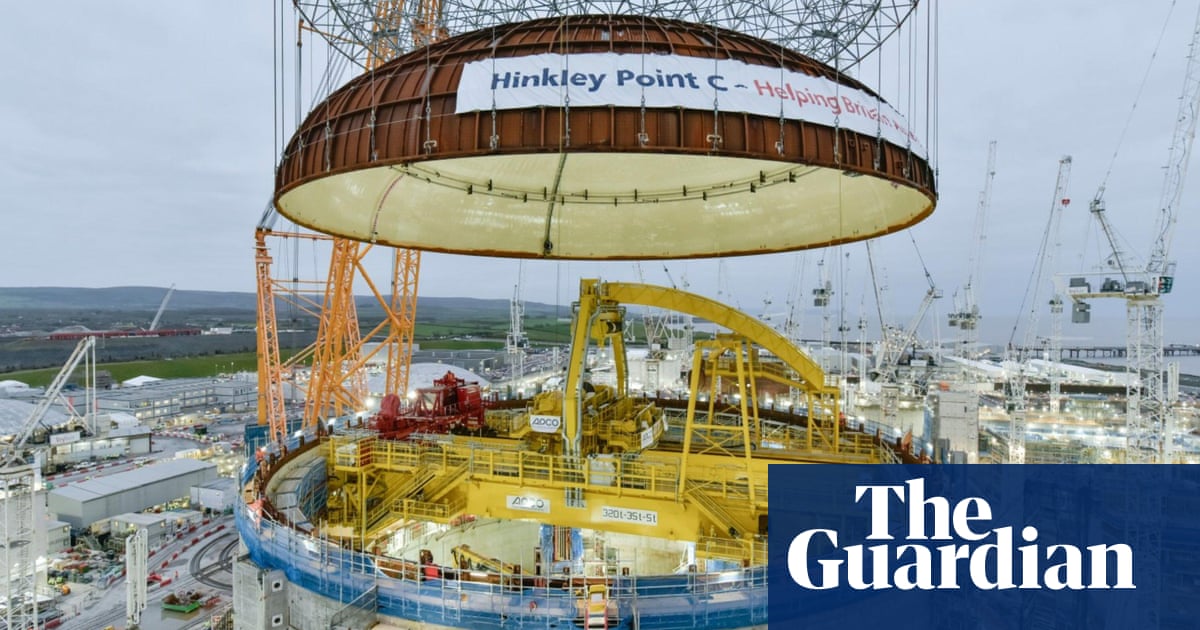Keir Starmer ignored warnings from his nuclear safety watchdog that it was wrong to blame regulations for delays building new reactors when he launched a plan to revive the nuclear power industry.
The prime minister unveiled thenuclear renaissance strategy in Februaryand said investment had slumped because the industry was “suffocated by regulations”.
However, a document released under freedom of information law reveals that the UK’sOffice for Nuclear Regulation(ONR) told the government in the run-up to the launch that claims about delays to nuclear power in a draft press release were “not true”. Despite this, the claims were repeated in the final release.
ONR was asked to comment on a draft government announcement ofa taskforceto speed up the regulation of nuclear power. It made four corrections tothe draft, which was passed to the investigative journalism cooperativeThe Ferret, and shared with the Guardian.
But none of ONR’s corrections were implemented when Starmermade the announcementon 6 February, under the headline “Government rips up rules to fire up nuclear power”.
The attack on nuclear regulations was part of Labour’s attempt toprove its growth credentialsand coincided with itclipping the wingsof the competition watchdog and hauling in regulators to demand they do more to boost the economy.
The draft release stated that three European regulatory regimes had reached different assessments of the design of the reactors being built atHinkley Point Cin Somerset, “leading to delays and increased costs”.
ONR said this was “not accurate” and that ithad refutedsuch claims before. “Our feeling is that linking regulatory factors into the increasing Hinkley Point C costs and timeframes isn’t true and the sentence doesn’t stand up,” it said.
ONR also suggested that the new taskforce should look at not the “approval” but the “deployment” of new reactor designs. “The reactor approval process has no bearing on the overall speed of delivery, but rather construction,” it said.
Neither amendment was made in Starmer’s announcement, which reiterated the disputed wording in the draft. Two other changes suggested by ONR were also rejected.
The energy company EDFpredictedin 2007 that electricity from Hinkley Point C would be cooking Christmas turkeys in 2017. EDFsaid in January 2024that the station might not be finished until 2031.
The estimated total cost of building the planthas risenfrom £18bn in 2016 to £35bn in 2024. This could increase to £46bn when inflation is taken into account.
According to ONR, its assessment of the reactor design was completed in 2012 but construction did not start until 2017. Its regulation had not delayed building since then, it said.
Sign up toBusiness Today
Get set for the working day – we'll point you to all the business news and analysis you need every morning
after newsletter promotion
Dave Cullen, who co-chairs aforum for ONR and campaign groups, described Starmer’s announcement as misleading.
“I’m shocked by the cynical and unprofessional approach of the government to this announcement,” said Cullen, who is independent of ONR. “It seems as though it would rather attack an imaginary problem than seriously consider how to approach energy security.”
Andrew Blowers, an anti-nuclear campaigner and emeritus professor of social sciences at the Open University, accused Starmer of “ignorant prejudice” in blaming regulators for delays.
ONR said the draft press release was “shared under a strict embargo just a few days before release, with an opportunity for ONR to make representations on accuracy.”
It added: “Dialogue about specific sections of the press release, and in some cases, representations made about the accuracy of sentences/sections is standard practice discussion between communications teams.”
TheDepartment for Energy Security and Net Zerodid not address the rejection of ONR’s corrections. “ONR has been informed of the review and will provide an important source of expertise as it progresses,” a spokesperson said.
